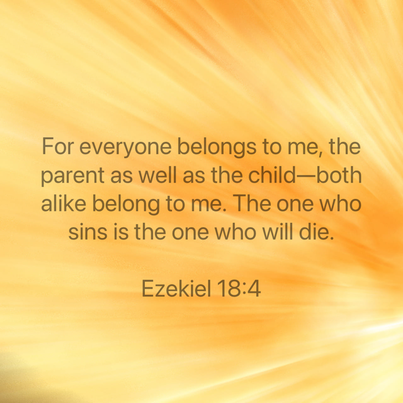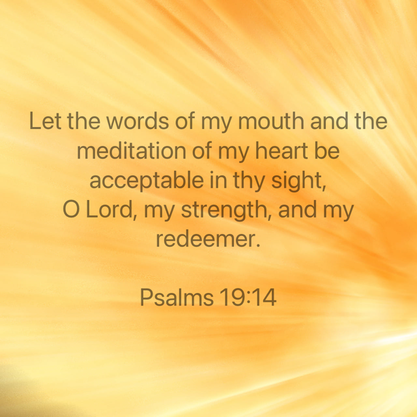|
Good morning!
Today is Pentecost!
When we were able to meet in person, we shared our joys and concerns together. Take some time to think about your past week, and the prayer requests you may have. If you would like, you can share them in the comments of this post. When you are ready, use the prayer below to get started:
Heavenly Father, O Lord Almighty, hear my prayer. I have a burden on my heart, a sin to confess. For I am human and sinful and don't always live up to who you want me to be. I come before you today with a humble heart to confess the mistakes I've made, both by what I've done and by what I haven't done. O Lord, hear my prayer and forgive my failings. Lead me to do better and not repeat these mistakes. Help me to live a life that better reflects you. For you are faithful and just, loving and compassionate. O Lord, in your mercy, forgive me and purify my heart. Amen.
This week's lesson is on Ezekiel 18:1-9, 30-32.
Ezekiel was a prophet when Babylonians conquered Jerusalem and took King Jehoiachin and thousands of the most prominent and skilled people of Judah to Babylon. This included Ezekiel. The ruin of Jerusalem was devastating for the exiles. Jeremiah’s book of Lamentations captures the anguish that the that the destruction of the city and loss of human life caused. This was a recent Sunday School lesson. Though some were left in Jerusalem and in Judah, the survivors to who Ezekiel spoke were those taken away to Babylon. They lived together by the river Kebar. The Babylonian exile created great uncertainty about the people’s relationship with God. Could God, who had allowed his holy city to be ravaged and his people carried into exile, still care for the people? And if he still cared, could he actually take care of them in a foreign nation? God communicated with his people even in exile. His continuing to speak to Ezekiel was meant in part to reassure the people that God was still with them in a foreign land. As the exiles wallowed in the misery of their situation, now in its sixth and seventh year, they naturally tried to come to grips with the reason for it. They quoted a proverb that said, “The fathers sin, the children suffer.” They claim that their problem is inherited, the exiles deny responsibility or guilt on their part. The fact that the sins of one generation have consequences for another is not the same as saying God punishes an innocent group for the sins of a guilty group. The exiles apply their proverb to disavow any culpability for their situation. In so doing, they can claim that God is unjust in his dealings with them. Everyone belongs to God since he is the sovereign Creator. This includes his chosen people as well as their Babylonian oppressors. His justice was not and is not limited by national borders. Therefore he has the right to declare that the one who sins is the one who will die. Each person is responsible to God for his or her own sin, and God will deal with each person individually. A righteous man has proper love for God and it begins with worshiping no other gods. He or she remained dependent on God alone for health and protection. He also exhibits godly love towards others. God is the protector of the downtrodden, and expected his people to be the same. The righteous person does not the selfish, sinful ways of others in any respect. God will not judge or punish the righteous person for the sins of others- period. Each individual had the freedom to choose life or death. God extended an offer of forgiveness through repentance. If the people did not have free will, then they would not have been responsible. People are capable of knowing right from wrong, and God deals with us on that basis. The blame for one’s sin and judgment cannot be shifted to God, Satan, nature, nurture, parents or circumstances. God takes no pleasure in the destruction of his creation. He wants to deliver people from their unfaithfulness and the death that it brings. He judges but he also provides all the people with the means of salvation, so they can avoid that judgment. God issues an invitation to repent and live, as he has done so many times before. He demonstrates love by his willingness to set people free from their sinful past and the punishment they deserve. Yet he demonstrates his holiness by not allowing sin to continue indefinitely.
Conclusion
The exiles imagined themselves to be victims of cosmic injustice. They viewed themselves as serving a sentence intended for the prior generation. The history of God’s people reveals that they had always been incapable of keeping the covenant. Before Moses bought the Ten Commandments down from Mount Sinai, Aaron had already constructed the gold calf and led the people into idolatry. The book of Judges outlines the nation’s checkered history of obeying God. The exiles were not unique in their ability to view themselves as morally superior to the prior generation. Jesus called out similar duplicity in the Pharisees, who insisted that if they were alive at the time of the prophets, they would not have murdered them. Indeed, they had already plotted to kill Jesus. The hearts of the people were always incapable of obeying God fully. So God promised a new creative act: he would give the people new hearts, one capable of being sensitive and obedient to God’s Word. This truth was intended to prevent Ezekiel’s audience from slipping into despair or apathy that came with believing they were victims of their parents decisions. Each person was charged with the responsibility of turning from his or her sinful ways and returning to God, in order that they would avoid being destroyed by the consequences of their sins. This is ultimately fulfilled through following Jesus in the plan of salvation. Those who do so received the Holy Spirit, who daily recreates our hearts and minds to be like Christ. Prayer God, we see moral goodness in ourselves, but you see your image marred with sin. We confess that your assessment of our situation is correct. We thank you for providing mercy and renewal. In Jesus name we pray. Amen
Benediction
This week's benediction is from the Jubilee Bible.
Next week's lesson will be on Jonah 3.
0 Comments
Leave a Reply. |
AuthorWe are a small, rural Presbyterian church in southwestern Pennsylvania. Archives
July 2024
Categories
All
|



 RSS Feed
RSS Feed